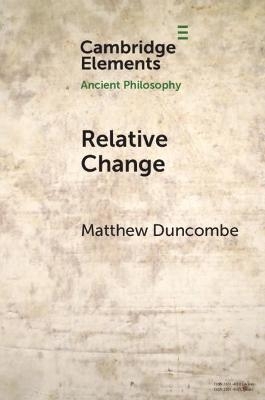
Relative Change
Seiten
2020
Cambridge University Press (Verlag)
978-1-108-71342-9 (ISBN)
Cambridge University Press (Verlag)
978-1-108-71342-9 (ISBN)
A relative change occurs when some item changes a relation. This Element examines how Plato, Aristotle, Stoics and Sextus Empiricus approached relative change. Relative change is puzzling because the following three propositions each seem true but cannot be true together: (1) No relative changes are intrinsic changes; (2) Only intrinsic changes are proper changes; (3) Some relative changes are proper changes. Plato's Theaetetus and Phaedo property relative change. I argue that these dialogues assume relative changes to be intrinsic changes, so denying (1). Aristotle responds differently, by denying (3) that relative change is proper change. The Stoics claimed that some non-intrinsic changes are changes (denying (2)). Finally, I discuss Sextus' argument that relative change shows that there are no relatives at all.
Matthew Duncombe is an Assistant Professor in the Department of Philosophy at the University of Nottingham. He held a British Academy Postdoctoral Fellowship at Durham University and was a post-doctoral research fellow at the University of Groningen. He studied philosophy and Classics at the University of Cambridge.
Introduction; 1. Plato; 2. Aristotle; 3. Stoics and Sceptics; Conclusion.
| Erscheinungsdatum | 01.10.2020 |
|---|---|
| Reihe/Serie | Elements in Ancient Philosophy |
| Zusatzinfo | Worked examples or Exercises |
| Verlagsort | Cambridge |
| Sprache | englisch |
| Maße | 230 x 150 mm |
| Gewicht | 120 g |
| Themenwelt | Geschichte ► Allgemeine Geschichte ► Altertum / Antike |
| Geisteswissenschaften ► Philosophie ► Allgemeines / Lexika | |
| Geisteswissenschaften ► Philosophie ► Logik | |
| Geisteswissenschaften ► Philosophie ► Philosophie Altertum / Antike | |
| ISBN-10 | 1-108-71342-4 / 1108713424 |
| ISBN-13 | 978-1-108-71342-9 / 9781108713429 |
| Zustand | Neuware |
| Informationen gemäß Produktsicherheitsverordnung (GPSR) | |
| Haben Sie eine Frage zum Produkt? |
Mehr entdecken
aus dem Bereich
aus dem Bereich


